14 Samoyed Pros & Cons You Should Know

Updated on
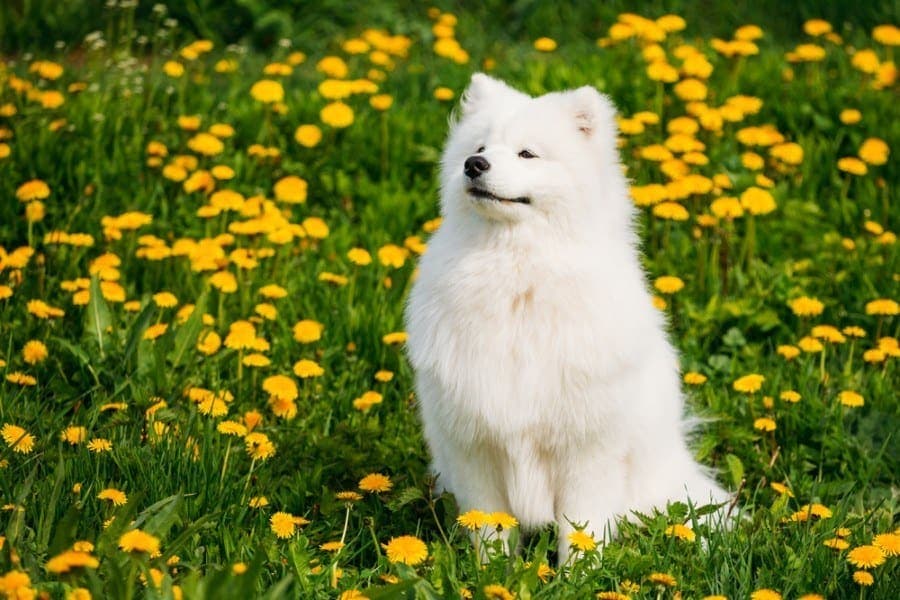
At first glance, the Samoyed is a giant ball of fluff! There’s more to these dogs than just the amount of fur that they have, though. They have positive and negative traits that will determine whether they’re a good match for your family.
Before you consider getting a Samoyed or any other dog breed, you need to consider the good and bad aspects of their temperament, habits, and care needs. The Samoyed isn’t just a conversation starter and a loyal friend; this is an animal that also needs plenty of exercise, training, and companionship. This guide is split into two sections and explores the pros and cons of the Samoyed breed.
The 7 Samoyed Pros
1. Adaptable
One of the best traits about the Samoyed is how well they adapt to all types of houses. They might look huge with all their fur, but they are not considered a large breed. As medium-sized dogs, they can live in apartments, provided that you meet their need for exercise in other ways. Their love for cuddling with you will make the close quarters even cozier!
While it’s generally recommended that you have a large house and a yard for this breed, there are ways to prevent your Samoyed from getting bored. As long as you give them plenty of exercise and take regular trips to the dog park to let them stretch their legs, they can flourish in an apartment.
2. Always Smiling
Samoyeds are also known as “Smiling Sammies” due to the fact that they seem to have a constant smile on their face. Their slightly upturned lips give them a doggish grin and are even part of the AKC’s breed standard. You can’t have a true, pedigree Samoyed without that smile!
It’s a huge part of why so many people love these dogs. Their fluffy coats and friendly, social natures endear these dogs to everyone, but it’s their ever-present doggy grins that truly make them stand out.
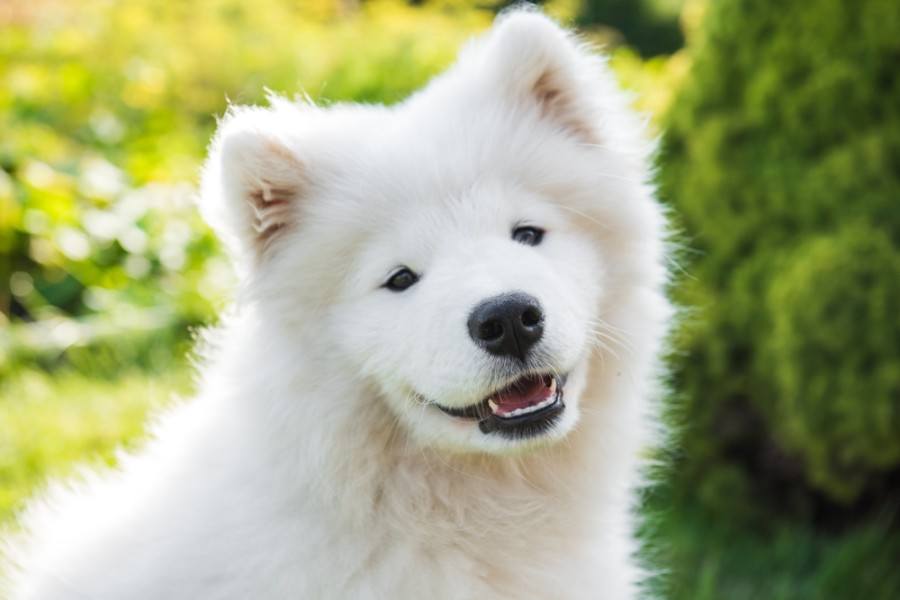
3. Easy to Train
Underneath their fluffiness and doggy grin, the Samoyed is an incredibly smart breed. They’re as mischievous as they are social, but they’re also hard workers.
Although they can be strong-willed at times and need a firm, consistent trainer, Samoyeds are eager to please their owners. Their intelligence also makes them suited for a range of tasks, from their original purpose as reindeer hunters, guardians, and sled dogs to being herders and companions. They’ve even been used as service dogs.
4. Popular
If you love meeting new people but can’t bring yourself to intrude on a stranger’s time uninvited or simply struggle to make friends on your own, a Samoyed is the perfect partner-in-crime. They are great conversation starters even when they don’t intend to be.
Their white fur, fluffiness, and constant doggy grin draw attention, so whether you’re out at the dog park or taking a stroll through town, you’re bound to meet a bunch of people who want to meet your dog.
The Samoyed is super friendly too, which further endears them to everyone you meet. Always make sure your dog is socialized and well-behaved before you let new people say hello.
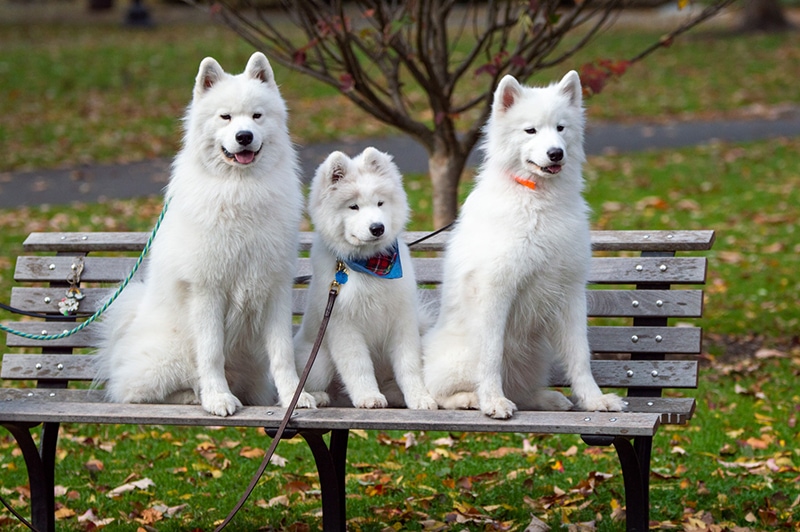
5. Family Friendly
Children adore these dogs just as much as adults do. Fortunately, Samoyeds love children too. In Siberia, they were bred to be close members of the family and provided warmth and companionship on hunts. Most of all, the Samoyed was part of the tribe. They adored everyone in their family, both young and old.
Once they’re properly socialized, Samoyeds will get along with children whom they meet on walks too. That said, always make sure to teach children how to respect dogs. No matter how friendly and non-aggressive the dog is, they can still get scared and react fearfully if they feel threatened.
6. Social Butterfly
It’s not just human social butterflies who benefit from the eye-catching Samoyed. These dogs adore the attention that they get too. They are always more than happy to meet new people and will love to say “hi” to your neighbors, the local sheriff, or strangers on the street.
The more people you introduce them to when they’re a puppy, the friendlier and more outgoing they’ll be later. They’ll also be calmer when they meet new people, so don’t skip out on puppy classes, socialization, and obedience training.
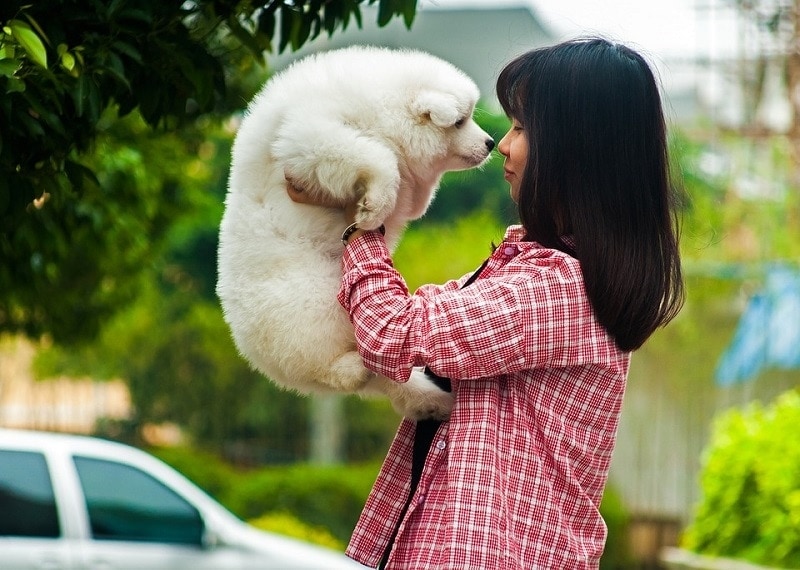
7. Warm Cuddles in Winter
Samoyeds were first bred in Siberia and needed to be able to withstand the frigidly cold temperatures of towns like Oymyakon. Like the Siberian Husky and other Siberian breeds, these dogs used to cuddle with their nomadic families for warmth.
Today, the Samoyed is a beloved companion in places all around the world, and they’re just as cuddly and warm. If you live in an area with cold winters—even if it doesn’t get as cold as Siberia—the Samoyed is the perfect dog for curling up with on the couch on chilly winter nights.
The 7 Samoyed Cons
1. Conversation Starters
One of the biggest positives for the Samoyed is also one of their biggest cons, depending on your personality. Wherever you take your Samoyed, you will be drawn into conversation with all sorts of people who are curious about the massive bundle of fur at your side. While this is great if you’re a social butterfly yourself, it can be a massive downside if you prefer to be left alone.
If you’d rather fade into the background and take quiet walks with your furry best friend, a Samoyed isn’t the best choice. Their pure white fur alone draws attention, and considering the amount of fur that they have, they’re hard to miss.
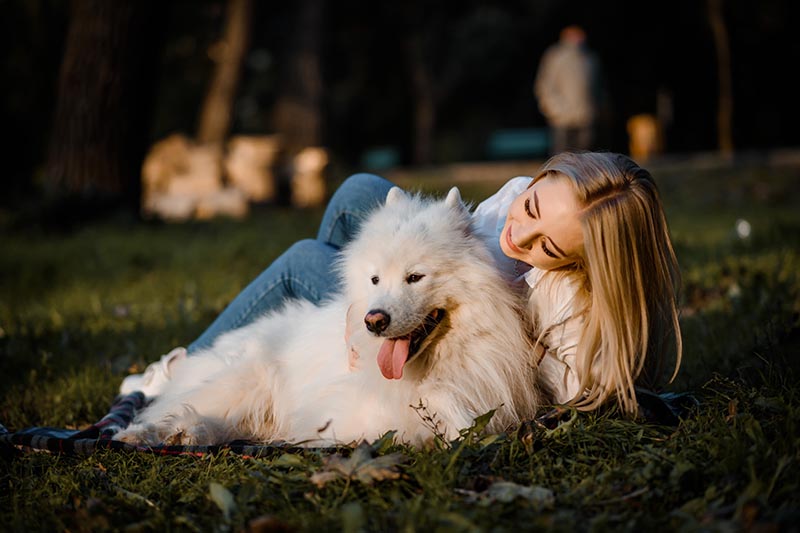
2. Excessive Shedding
Owning a dog means dealing with shed hair. Some breeds might shed less than others, but the Samoyed isn’t one of them. Their fluffiness generates a great deal of loose hair that will inevitably end up scattered everywhere. With the length and thickness of their double coat, that shouldn’t come as a surprise!
Samoyeds will shed throughout the year, even outside of the shedding seasons. This means they need a significant amount of grooming. If you don’t brush their fur regularly, you’ll find fur all over the place, including areas that you might not expect.
Brushing their coat once or twice a week or even daily will keep their fur free from tangles and clean. It’ll also help manage the loose hair scattered throughout your home.
3. Exercise Needs
Despite their adaptability, Samoyeds are not lazy dogs. They were bred to be working animals, but today, they’re mostly companion dogs and don’t typically have active jobs to do, especially when they live in an apartment.
This means you will need to find time to manage their activity level. You’ll need to take regular walks and set aside plenty of time for playtime, preferably in a large, fenced space with plenty of room for your Samoyed to run around.
Don’t forget to keep their brains active! Your Samoyed’s intelligence will need an outlet because if they’re left to their own devices for too long, they’ll find ways to amuse themselves. They can be destructive and noisy when bored.
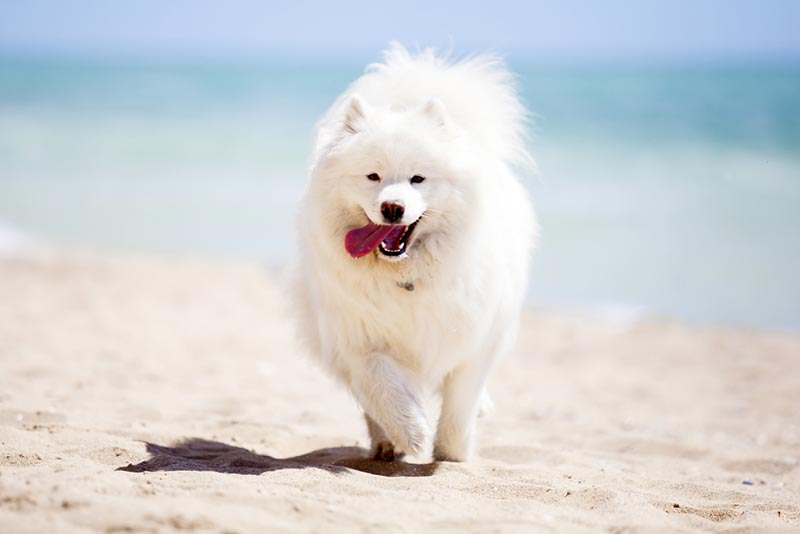
4. Expensive
As with all pedigree breeds, the Samoyed is expensive. They’re popular, which makes them easy to find, but the demand also pushes up the price. You can expect to find a purebred Samoyed for anywhere between $100 and $3,500, depending on if you visit a shelter or a breeder. They might cost more depending on the breeder and if they’re from a champion breed line.
This initial price doesn’t include ongoing care costs. Basically, pets aren’t cheap, and you need to budget appropriately for their food, health, grooming, and other needs.
5. High Prey Drive
Considering how friendly the Samoyed is, it might be surprising when you realize that they have a high prey drive. This trait stems back to their ancestors, which were originally bred to hunt. Although they moved on to herding and guarding when the Samoyedic people stopped hunting reindeer, the Samoyed is still a hunter at heart.
Without training and socialization, Samoyeds have been known to chase smaller animals like cats, smaller dogs, squirrels, and other wild animals. You’ll never completely train these instincts out of your dog and you should keep them leashed on walks, but you can help them control their urge to chase fellow pets in the house.
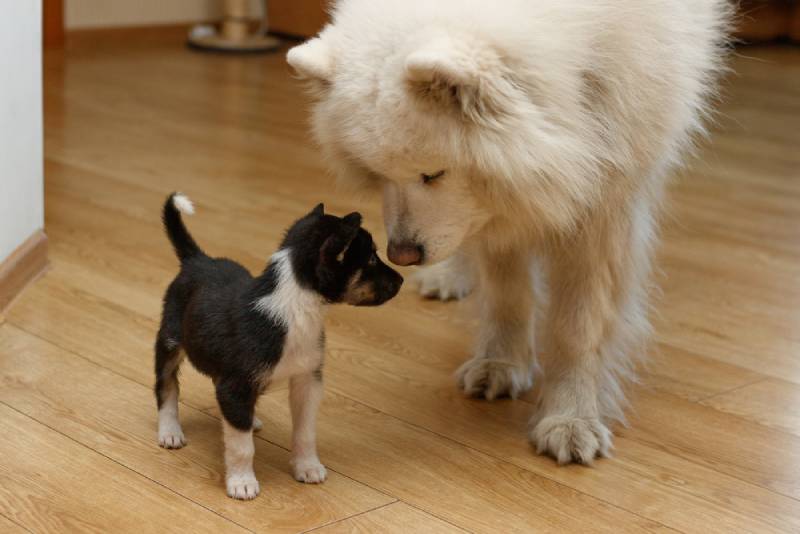
6. Noise
Unfortunately for prospective owners who are looking for a quiet dog, the Samoyed is one of the worst options. They aren’t just barkers either; they’re also fond of howling whenever they get the chance.
As pack dogs, they use their voices to communicate with each other and their family members, both human and canine. This can be useful if they have a job to do and you need them to bark. But it’s problematic if you or your neighbors prefer peace and quiet.
This noisiness can be managed through training and by keeping your Samoyed active. Leaving them alone for too long or letting them get bored will often lead to them loudly expressing their displeasure.
7. Stubbornness
Despite being eager to please and quick to pick up new things, the Samoyed can be stubborn. They love to know when they’ve made you happy, but they’re also intelligent enough that they’ll find solutions to problems on their own. Unfortunately, this can make training them a challenge for first-time dog owners.
You need to be firm and consistent without relying on harsh corrective measures. House training, obedience, and socialization are all necessary for your Samoyed. If they get bored during training sessions, you’ll lose their attention. Their stubbornness and intelligence can quickly cause them to develop unwanted behavioral issues as they find more interesting ways to do the things that they want to do.
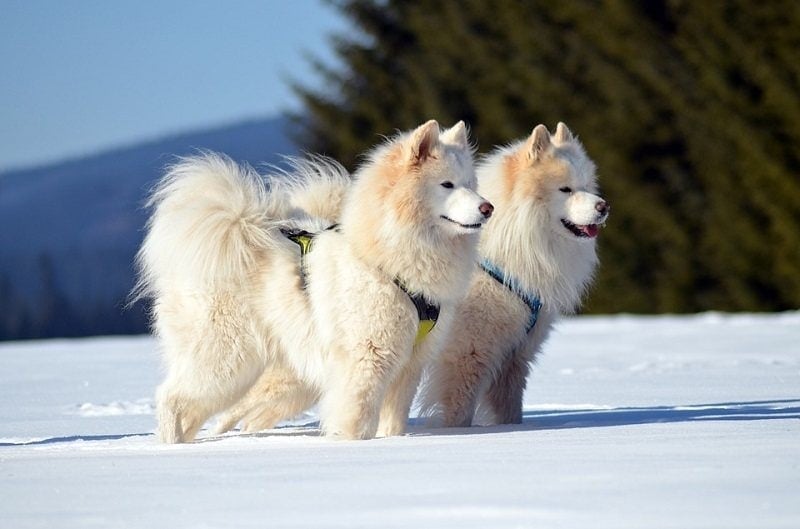
Conclusion
All dogs have their pros and cons. Considering both will help you determine whether a breed like the Samoyed is right for you. While they’re super friendly, incredibly intelligent, and delightfully fluffy, these dogs need a great deal of exercise, training, and grooming. We hope that this list of pros and cons will help you decide whether a Samoyed will fit in with your family.
See also:
- Male vs. Female Samoyed: Differences Explained (With Pictures)
- Are Samoyeds Good With Cats? Facts & FAQ
Featured Image Credit: Grisha Bruev, Shutterstock












